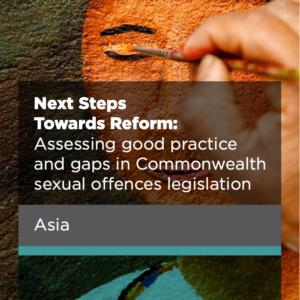The sexual offences provisions in the Maldives are set out in the Penal Code 2014 (PC), the Sexual Offences Act 2014 (SOA) and the Special Provisions Act to Deal with Sexual Abuse Offenders of Children 2009 (SPA). Rules of evidence and procedure are in the Evidence Act and the Criminal Procedure Code. Some rules of evidence and procedure are also found in the PC, SOA and SPA, as described in the table below.
The laws of the Maldives are published only in the local language, Divalhi. There are no official English translations of relevant Maldives legislation. This review is based on a semi-official translation of the PC and local expert translation of the SOA and the SPA. The Evidence Act and the Criminal Procedure Code have not been included in this report as English translations were not publicly available. Every effort has been made to confirm the accuracy of this report with local legal experts.
The law on sexual offences in the Maldives was reformed with a substantially revised Penal Code adopted in 2014. The SOA was adopted in the same year. Criminal law, including sexual offences, is based on a model of Muslim Sharia law and applies to Muslims and non-Muslims. Under the Maldives’ criminal law, all consensual sexual acts outside of marriage are criminalised. A range of non-consensual sexual acts are also criminalised.
The legislation meets the good practice standards in some respects. The SOA has gender-neutral offences and covers penetration of all orifices by any body part or object, as well as other sexual assaults, such as touching. The SPA criminalises all forms of sexual activity with children under 18 years, including performing sexual acts in front of a child and forcing a child to watch a sexual act. ‘Grooming a child for sexual abuse’ is a limited offence under the Protection of the Rights of Children Act 2019. However, this offence is too narrow and does not criminalise grooming by all persons.
In many other respects, the Maldives’ sexual offences legislation does not meet the good practice standards and is not human rights compliant. For example, under both the PC and the SOA, marital rape is not an offence except in very limited circumstances and carries lower penalties than non-marital rape. Failing to criminalise marital rape in all circumstances denies married women and girls their fundamental human right to dignity, safety of their person and sexual autonomy.
The PC and the SOA apply stringent requirements for the corroboration of rape or other sexual assault. The SOA also allows a defendant to rely on evidence that the complainant delayed reporting the sexual assault, allowing a negative interference to be drawn from the delay. There are many legitimate reasons why a person delays reporting their sexual assault, including trauma and fear of retaliation. Further, the SOA allows a defendant to give evidence of his prior sexual conduct with the complainant without any restriction as to its relevance or other safeguards for the protection of the privacy and rights of the complainant. At the same time, the PC criminalises ‘false accusations’ of rape or other sexual violence. Although not assessed in this report, such laws have the effect of deterring victims from coming forward to report the crimes against them and exposes them to criminal prosecution and further victimisation. The criminalising of all forms of consensual sexual activity outside of marriage (‘zinah’) under the PC and the SOA, can have the same effect. These provisions, especially when taken together, are likely to have a chilling effect on the reporting of sexual offences, make convictions difficult to achieve and undermine the criminal law objectives of protecting people from criminal harm and providing accountability for, and deterrence of, criminal conduct.
Consensual sexual activity between people of the same sex is expressly criminalised under the PC and the SOA, perpetuating the vilification of and discrimination against LGBT people in violation of their fundamental human rights. Criminalisation also denies LGBT victims of sexual violence equal access to, and protection of, the law.
The Maldives is a state party to some relevant international human rights treaties, including Convention on the Rights of the Child, Convention on the Rights of Persons with Disabilities, Convention on the Elimination of All Forms of Discrimination against Women, International Covenant on Civil and Political Rights and Convention against Torture and Other Cruel, Inhuman or Degrading Treatment or Punishment.
Read more about the criminalisation of LGBT people in the Maldives.



